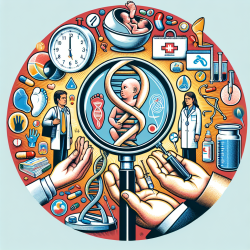Understanding Early Intervention in Duchenne Muscular Dystrophy (DMD)
The recent "Early Care (0–3 Years) In Duchenne Muscular Dystrophy Meeting Report" has shed light on the critical importance of early intervention for children diagnosed with Duchenne Muscular Dystrophy (DMD). This report highlights the significance of timely diagnosis and the implementation of therapeutic strategies to improve outcomes for young children. As practitioners, understanding these findings can guide you in enhancing your practice and advocating for early intervention services.
Key Findings from the Meeting
The meeting emphasized the need for early diagnosis, evidence-based guidelines, and comprehensive care for children with DMD. Here are some of the key findings:
- Diagnostic Challenges: Delays in diagnosis are prevalent, often due to a lack of newborn screening (NBS) and disparities based on ethnicity. Early identification through NBS can significantly improve outcomes.
- Therapeutic Interventions: The use of corticosteroids and exon-skipping drugs in young children shows promise. Early initiation of these therapies may help preserve motor function and improve developmental outcomes.
- Clinical Trials: Ongoing trials are exploring the efficacy of various drugs and gene therapies in young children, highlighting the potential for altering the disease trajectory.
- Family Support: Providing comprehensive information and support to families is crucial. Tailored interventions and resources can help families navigate the complexities of DMD care.
Implications for Practitioners
As a practitioner, integrating these findings into your practice can enhance the care you provide to children with DMD and their families. Here are some actionable steps:
- Advocate for Early Screening: Support initiatives for NBS to ensure early diagnosis and intervention for DMD.
- Stay Informed on Therapeutic Advances: Keep abreast of the latest research on corticosteroids, exon-skipping drugs, and gene therapies to offer informed recommendations to families.
- Provide Comprehensive Family Support: Develop resources and support systems tailored to the needs of families dealing with a DMD diagnosis.
- Collaborate with Multidisciplinary Teams: Work closely with genetic counselors, neurologists, and other specialists to provide holistic care.
Encouraging Further Research
The meeting report also underscores the need for further research and collaboration to develop consensus guidelines for the early care of children with DMD. As a practitioner, you can contribute to this effort by participating in research studies, sharing your insights, and advocating for policy changes that support early intervention.
To read the original research paper, please follow this link: The Early Care (0–3 Years) In Duchenne Muscular Dystrophy Meeting Report.










